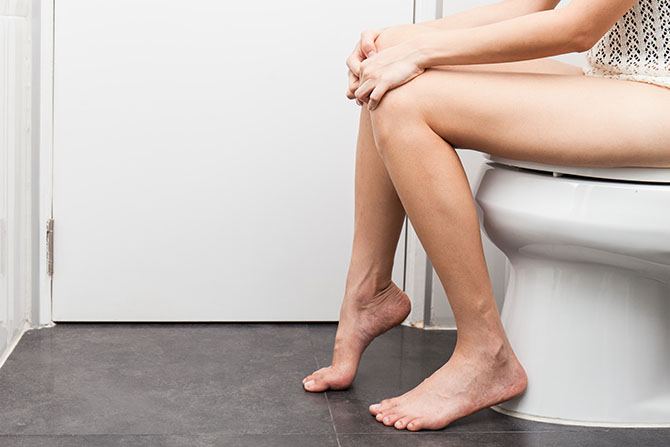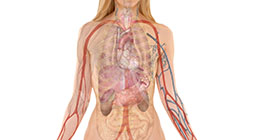
Overview
Symptoms
Causes
Prescription
Health Tips
Constipation strikes nearly everyone occasionally, but 20 percent of people are chronically constipated. Few wish to discuss the problem, obtaining only the little knowledge available from laxative advertisements and packaging. Constipation occurs when it becomes necessary to strain in order to remove hard feces, or when waste is not eliminated from the body in an appropriate amount of time.
At least one large bowel movement per day, or two to three smaller ones (about 12 inches of waste should be excreted in total) is ideal. The feces should be soft, bulky and easy to pass. While constipation may affect all age groups and both sexes, it occurs more often in women and the elderly.
North Americans spend almost one billion dollars per year on laxatives and in the United States, constipation is the most frequent digestive health complaint.
Symptoms
Severity and occurrence can vary greatly. Severe constipation may cause stool to become impacted which requires medical attention as impaction can be dangerous.
Common symptoms:
- Abdominal pain
- Bloating
- Bowel movements that are difficult to pass
- Gas
- Infrequent, small, hard and dry stools
Chronic constipation may lead to:
- Bad breath
- Body odour
- Depression
- Fatigue
- Headaches
- Hemorrhoids (a type of varicose vein)
- Insomnia
- Irritability
- Obesity
- Skin problems
Poor elimination may cause toxins to build up leading to more serious bowel disease.
Causes
Poor diets that are low in fiber and high in red meat, dairy, and processed foods often cause constipation. The typical Western diet does not include enough whole, natural food and relies far too much on what is convenient; either fast foods or store-bought packaged foods that are processed to ensure a long shelf life and are devoid of fiber. Packaged food is usually high in sugars, sodium, artificial flavours, and chemical colourants that lead to constipation for some. In addition to diet, inadequate fluid intake or a sedentary lifestyle may also contribute.
Diseases and health conditions such as IBS, hypothyroidism, diabetes, bowel cancer, spinal cord injury or multiple sclerosis may cause constipation.
Other factors that can increase one’s chances of constipation are:
- Certain painkillers and iron supplements
- Change in routine
- Depression
- Medications, such as antidepressants
- Nutritional deficiency
- Parasitic infection
- Pregnancy
- Stress
- Travel
- Yeast overgrowth
Prescription for Health
| Nutrient | Dosage | Action |
|---|---|---|
| Vitamin C (in the form of either calcium ascorbate, or magnesium ascorbate, or potassium ascorbate) | Take vitamin C to bowel tolerance. Start taking powdered C in gram doses mixed in juice or water every hour until loose stools occur; then cut back until stool is no longer loose; then as a preventative, take 500 mg twice daily | Softens stools, promotes elimination and strengthens intestinal capillaries |
| Magnesium citrate, carbonate or sulfate | Up to 1000 mg taken in divided doses throughout the day until stools are softened | These forms have a laxative action |
| BeRegular® Prebiotic Fiber & Probiotic Blend, it goes clear in water and has no taste, no grit, no glop | One scoop – 6 grams
Guar fiber – 5 grams fiber Bifidobacterium lactis – 8 billion CFUs |
Promotes healthy elimination; treats IBS, bloating, gas, diarrhea, constipation in kids and adults |
| Digestive Enzymes | 1 caplet with each meal; contains plant enzymes | Aids digestion and nutrient absorption alpha-amylase, cellulase, lactase, bromelain, papain, and lipase |
Health Tips to Enhance Healing
- Avoid deep-fried foods, foods high in sugar and other refined carbohydrates (like white bread), caffeine, alcohol and dairy (except yogurt).
- Consume vegetables or fruits at every meal; ideally seven to ten half-cup servings per day. If eating raw veggies causes digestive upset switch to steamed; it’s easier on the digestive system. And remember – food that comes from a box is bad for the bowels.
- Do not use commercial laxatives because they promote dependence and chronic constipation.
- Drink plenty of pure, filtered water each day, but do not drink during meals which will dilute digestive enzymes. For every alcoholic beverage consumed, drink another eight to ten ounces of water. Drinking enough water daily along with a high-fiber diet is more beneficial than eating a high-fiber diet on its own.
- Enjoy meals in an atmosphere that is relaxed and pleasant. Don’t work during meals or eat while rushed or while standing.
- Get plenty of exercise.
- Get tested for food allergies.
- Get tested for low thyroid function.
- Include high-fiber foods such as prunes or other dried fruit, whole grains or seeds (especially ground flaxseed or psyllium seed), and sauerkraut (or sauerkraut juice); these are effective in alleviating constipation and support the body’s digestive functions naturally.
- Take time each day to have a bowel movement. Preferably the same time every day. Do not be rushed, eventually the body will respond at the same time each day.
- Yoga or tai chi are great for helping to improve circulation, reduce tension and promote healthy digestion and elimination. Stretching exercises such as bending to touch the toes or drawing knees up to the chest are also good to get the bowels moving.










